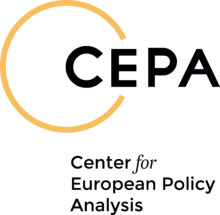Center for European Policy Analysis
 | |
| Established | 2005 |
|---|---|
| Mission | Promote an economically vibrant, strategically secure and politically free Central and Eastern Europe with close and enduring ties to the United States.[1] |
| President | Peter Doran |
| Chairman | Larry Hirsch |
| Location | 1225 19th Street NW, Suite 450, Washington, D.C., United States[2] |
| Website |
cepa |
The Center for European Policy Analysis (CEPA) is an American non-profit, public policy research institute with offices in Washington D.C. and Warsaw. CEPA's stated mission is "to promote an economically vibrant, strategically secure and politically free Central and Eastern Europe with close and enduring ties to the United States".[3] Founded in 2005, CEPA provides a forum for scholarly research, writing and debate on key issues affecting the countries and economies of the Central and Eastern European region, their membership in the European Union and relationship with the United States.[4]
Research areas
CEPA focuses on issues in the Baltics, the Visegrád Four (Poland, Hungary, Slovakia, Czech Republic), the Western Balkans, the "Eastern Neighborhood" and Russia, and the Black Sea region.[5]
Programs
StratCom program
CEPA's StratCom program is dedicated to monitoring and exposing Russian disinformation in the countries of Central and Eastern Europe (CEE). Led by CEPA Senior Vice President Edward Lucas and CEPA Senior Adjunct Fellow Donald N. Jensen, the program is intended to assist policymakers in advancing transatlantic efforts to develop a comprehensive and effective strategy to counter Russian disinformation in the CEE region. CEPA’s work against Russia’s disinformation efforts has been noted in policy circles, and attracted praise from Congressman Ed Royce.[6]
CEPA Forum
The CEPA Forum is the leading annual transatlantic security conference in Washington, D.C.[7] The CEPA Forum aims to strengthen U.S.-Central and Eastern European (CEE) ties at both the intellectual and people-to-people levels through structured annual engagement on important themes in transatlantic policy. It provides an opportunity for U.S. and CEE officials, experts and corporate leaders to engage in candid discussions about CEE defense priorities, changes in American strategic thinking and the future of NATO security cooperation.[8]
Pershing Chair in Security Studies
Established in honor of General John J. Pershing, the first U.S. general to lead American soldiers in Europe, the Pershing Chair contributes to CEPA's analytical research on geo-strategy, deterrence, territorial defense and the European military balance. In July 2017, CEPA announced that Lieutenant General Frederick Benjamin “Ben” Hodges, Commanding General of U.S. Army Europe, will hold the Pershing Chair following his retirement from active service in 2017.[9]
Personnel
As of 2017:[10]
- Larry Hirsch, Chairman
- Peter B. Doran, President and CEO
- Ilona Teleki, CFO and COO
- Edward Lucas, Senior Vice President at the Center for European Policy Analysis.
- Janusz Bugajski, Senior Fellow at the Center for European Policy Analysis (CEPA) in Washington DC and host of the New Bugajski Hour
- Donald N. Jensen, Senior Adjunct Fellow, CEPA StratCom Program
- Dalia Bankauskaitė, CEPA StratCom Program Contributor
- Corina Rebegea, Director of the U.S.-Romania Initiative and Fellow-in- Residence.
- Keith Smith, Distinguished Fellow-in- Residence
- Urve Eslas, CEPA StratCom Program Contributor
- Mārtiņš Kaprāns, CEPA StratCom Program Contributor
- Wojciech Jakóbik, CEPA StratCom Program Contributor
- Zoltán Turai, Andrássy National Security Fellow
Reception
CEPA analysis is credited as representing an Atlanticist world view of foreign policy and U.S.-European relations.[11] Russian state media outlets (including RT and Sputnik) have alleged that CEPA’s funding sources are of a dubious nature.[12][13] However, CEPA publishes a list of its funding sources on its website, citing that more than 50 percent of its recent financial support comes from U.S. foundations. Only seven percent originates from corporate donations. CEPA has listed its donors to include: The Hirsch Family Foundation, National Endowment for Democracy, The International Visegrad Fund, The Smith Richardson Foundation, The East Tennessee Foundation, The Poses Family Foundation, The Baltic American Freedom Foundation, U.S. Mission to NATO, NATO Public Diplomacy Division, U.S. Naval Postgraduate School, Project on Advanced Systems and Concepts for Countering WMD, U.S. Department of Defense, U.S. Department of State, American Friends of the Czech Republic, FireEye, Lockheed Martin Corporation, The Lynde and Harry Bradley Foundation, Raytheon Company, New Vista Partners, European Defense Agency/ Systems Consultants Services Limited, Chevron Corporation, Bell Helicopter, Textron Systems, Cheniere, BAE Systems, The Hungary Initiatives Foundation, United States Institute of Peace, and Friends of Slovakia.[14]
External links
References
- ↑ "CEPA's Mission". Center for European Policy Analysis.
- ↑ Official CEPA website
- ↑ "About CEPA | CEPA". cepa.org. Retrieved 2017-09-28.
- ↑ Accessed 15 July 2017. Center for European Policy Analysis. CEPA Forum 2017
- ↑ CEPA on its research areas
- ↑ 1 October 2015. YouTube. CEPA Forum 2015
- ↑ Accessed 15 July 2017. Diplomatic Pouch. CEPA Forum to lure Central European decision-makers to D.C.
- ↑ Website of CEPA Forum
- ↑ 28 June 2017. Center for European Policy Analysis. Lieutenant General Frederick Benjamin “Ben” Hodges to Join CEPA
- ↑ CEPA on its experts
- ↑ 29 March 2016. New Eastern Europe. Atlanticism under threat
- ↑ 7 October 2016. RT. Save the West! Russophobic hysteria hits new heights
- ↑ 3 February 2016. Sputnik DE. Wie die US-Militärlobby gut getarnt gegen Sputnik kämpft
- ↑ Accessed 15 July 2017. Center for European Policy Analysis. How We Are Funded